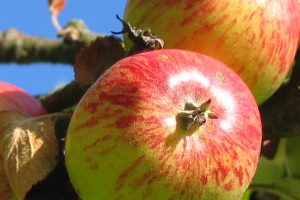Apple Tree Pruning: A Guide to Perfect Timing

Expert insight into the best time to prune an apple tree; why you should prune an apple tree, and how to identify common diseases during apple tree pruning.
The apple tree is not native to the UK, yet it has become a very popular addition to the English garden. With more than 7,500 cultivated varieties worldwide, the apple tree really does provide fruit for every taste, whether it’s being eaten naturally, baked, cooked or used to make cider.
The apple tree, known by its botanical name of malus domestica and also referred to as ‘Discovery’, is a small to medium sized tree that produces beautiful flowers in the spring and fruit that can be either ornamental or edible in the autumn. Growing only to a maximum of 8 metres but often less, this tree enjoys full sun and regular pruning.
Why prune an apple tree?
There are two key reasons for pruning an apple tree. One is to give next year’s fruit harvest a boost, and the other is to enhance this year’s crop. An apple tree that has been neglected will stop producing fruit and is likely to become unmanageable and unattractive.
When you prune a tree, you allow more air and sunlight to reach the fruit. This results in better fruit sweetness and increased fruit size as well as improved colour and much more straightforward harvesting. It will also reduce the threat of pests and disease. The fact you are able to see more with less foliage to contend with will help you spot any issues early on helps with this, as does a light and airy environment, as opposed to a damp and dark one.
Removing new shoots from an apple tree will lead to a greater harvest in the year that follows. The tree will, as a result of the pruning, be encouraged to produce even more fruiting spurs.
Your aim when pruning an apple tree is to take out the old to stimulate the new, and to create an open centre to the tree for better air and light penetration. Basically you are thinning out the tree, focusing on areas where the growth has become more crowded.
Care with apple tree pruning
You’ll need to take care not to prune any more than 20 per cent of the canopy each year otherwise you’ll see upright branches called watershoots sprouting. These serve no purpose and will not produce fruit or flowers.
You should always avoid pruning off larger limbs due to the risk of decay. Anything that is over 10cm in diameter should generally be left alone. The method and timing of pruning does however vary depending on the rootstock and type of growth form, i.e. whether it’s a bush tree or being trained in a restrictive form such as an espalier, cordon or pyramid, so be sure to consult the appropriate instructions for your particular type and form of apple tree.
When is the best time to prune an apple tree?
Untrained apple trees should be pruned every year, between November and March before the first leaves start to appear.
Trained apple trees on the other hand tend to benefit from summer pruning. Never attempt to prune a weak looking apple tree though, because when you take away the foliage, you remove the tree’s food source. Leave well alone until the tree gains strength.
For healthy trained apple trees, pruning is best carried out in July and August, although very advanced trees can be pruned earlier in the summer.
What to look for when pruning an apple tree
Apple trees are susceptible to various diseases and pests. Look out for shrivelled fruit clinging onto the shoots (brown rot) and ensure these are pruned out. Also look out for dark, flaky, shrunken patches on branches (apple canker); again cut out the affected parts but do not remove major limbs. Brown, shrivelled blossoms and die back of flowered shoot tips are signs of blossom wilt. If you see lots of dead branches then the tree may be suffering from honey fungus and is likely to need professional attention from a qualified tree surgeon.
Tree Preservation Orders
Never go ahead with any tree work without first checking whether there is a Tree Preservation Order (TPO) in place. If this is the case then permission must be sought for the works which can take up to eight weeks to be provided. Additionally, if the tree is located in a conservation area, permission must be obtained before commencing works of any nature.
The importance of apple tree pruning expertise
Apple tree pruning is quite a complex undertaking. Pruning needs to be tailored for optimum fruit harvest and not all trees are suitable for certain training forms. Unless you are aware of the cropping habit of the tree, you should not proceed any further.
It is, unfortunately, fairly easy to thwart an apple tree’s growth and fruit producing capabilities through inappropriate pruning. In this guide we have merely scratched the surface when it comes to apple tree pruning.
Apple trees can live as long as 50 years, but only if they are well cared for. They also make beautiful addition to any garden or open space, and will produce delicious fruit providing they remain healthy. If this is what you really want to achieve, it is advisable to seek professional assistance from a qualified tree surgeon when it comes to the annual pruning of the tree.
If you have an apple tree on your land that needs pruning, why not contact Tree Works? As fully qualified and extensively experienced tree surgeons, we are able to offer specialist knowledge and skill in all aspects of apple tree pruning. For a free, no-obligation quotation, give us a call on 07781 416 354 or get in touch here.

